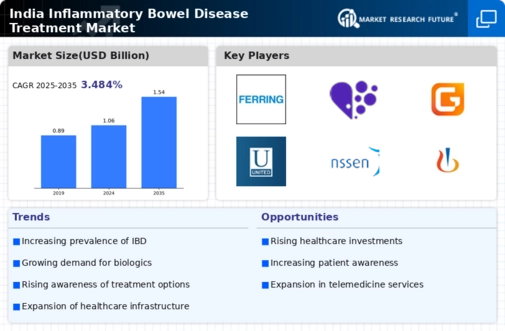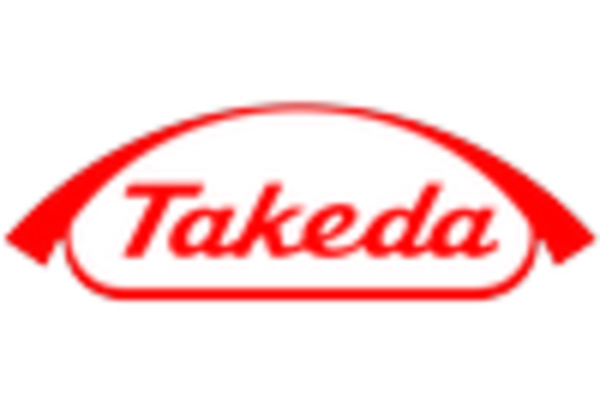Rising Healthcare Expenditure
India's increasing healthcare expenditure is a significant factor influencing the inflammatory bowel-disease-treatment market. With the government and private sectors investing more in healthcare infrastructure, there is a growing availability of advanced treatment options for IBD. The healthcare spending in India has seen a rise to approximately 3.5% of GDP, which translates to enhanced access to medications, diagnostic tools, and specialized care for patients suffering from IBD. This financial commitment is likely to facilitate the introduction of novel therapies and improve the overall quality of care. As patients gain better access to healthcare services, the demand for effective treatments is expected to surge, thereby positively impacting the inflammatory bowel-disease-treatment market. Additionally, the expansion of health insurance coverage is likely to alleviate the financial burden on patients, further encouraging them to seek necessary treatments.
Supportive Regulatory Environment
A supportive regulatory environment is essential for the growth of the inflammatory bowel-disease-treatment market in India. The government has been actively promoting the approval and accessibility of new therapies, which is crucial for addressing the unmet medical needs of IBD patients. Regulatory bodies are streamlining the approval processes for innovative treatments, thereby encouraging pharmaceutical companies to invest in research and development. This proactive approach is likely to result in a wider array of treatment options becoming available to patients. Moreover, the introduction of policies aimed at enhancing drug affordability and accessibility is expected to further stimulate market growth. As new therapies gain approval and enter the market, the treatment landscape for IBD in India is poised for significant transformation, ultimately benefiting patients and healthcare providers alike.
Increasing Awareness and Diagnosis
The growing awareness surrounding inflammatory bowel diseases (IBD) in India is a crucial driver for the inflammatory bowel-disease-treatment market. As healthcare professionals and patients become more informed about the symptoms and implications of IBD, there is a notable increase in diagnosis rates. This heightened awareness is likely to lead to earlier interventions, which can improve patient outcomes. According to recent estimates, the prevalence of IBD in India is around 1.4 million cases, indicating a substantial patient population that requires effective treatment options. Consequently, the demand for innovative therapies and management solutions is expected to rise, thereby propelling the growth of the inflammatory bowel-disease-treatment market. Furthermore, educational campaigns by healthcare organizations are likely to enhance understanding and encourage individuals to seek medical advice, further driving market expansion.
Technological Advancements in Treatment
Technological advancements in the field of medicine are playing a pivotal role in shaping the inflammatory bowel-disease-treatment market. Innovations such as biologics and biosimilars have revolutionized treatment protocols, offering new hope to patients with IBD. The introduction of targeted therapies has shown promising results in managing symptoms and achieving remission. In India, the market for biologics is projected to grow at a CAGR of around 15% over the next few years, reflecting the increasing adoption of these advanced treatment modalities. Furthermore, the integration of telemedicine and digital health solutions is enhancing patient monitoring and adherence to treatment regimens. These technological developments not only improve patient outcomes but also drive the demand for more sophisticated treatment options within the inflammatory bowel-disease-treatment market.
Growing Patient Advocacy and Support Groups
The emergence of patient advocacy and support groups in India is significantly influencing the inflammatory bowel-disease-treatment market. These organizations play a vital role in raising awareness about IBD, providing education, and offering emotional support to patients and their families. By fostering a community of individuals affected by IBD, these groups encourage patients to seek timely medical intervention and adhere to treatment plans. The presence of such support networks is likely to enhance patient engagement and empowerment, which can lead to improved health outcomes. Additionally, these organizations often collaborate with healthcare professionals and policymakers to advocate for better access to treatments and resources. As the influence of patient advocacy groups continues to grow, they are expected to drive demand for effective therapies within the inflammatory bowel-disease-treatment market.
















